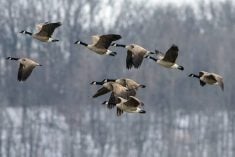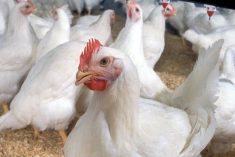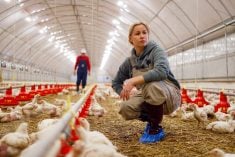Colorado is the latest state to confirm cases of bird flu in a dairy herd, the U.S. Department of Agriculture (USDA) said on April 25.
Nine states and have reported infections in 34 herds since the middle of March.
In a Colorado Department of Agriculture news release, Colorado State University veterinarian Maggie Baldwin said the highly pathogenic avian influenza (HPAI) virus is being spread between both dairy cows and herds.
“While we don’t yet completely understand the mechanism of transmission of this virus, we do know that it appears to be spreading from cow to cow and between herds,” she said.
Read Also

JBS profit falls amid still-challenging US market environment
JBS, the world’s largest meat company, reported a net profit fall in the third quarter in spite of a rise in global net sales amid a still-challenging beef market environment in the U.S., according to an earnings statement on Thursday.
Baldwin’s statement is consistent with a recent USDA announcement which said the department has identified spread between cows within the same herd, from cows to poultry and between dairies associated with cattle movements. There have also been cows without clinical signs that have tested positive.
The news comes hot on the heels of a U.S. Food and Drug Administration (FDA) national survey that found one in five samples of commercial milk in the U.S. tested positive for traces of bird flu.
The FDA said additional testing will be required to determine whether the intact pathogen is still present and if it remains infectious. At the same time, it said there is “no evidence” that the milk poses a danger or that a live virus is present. Earlier that week, the FDA said that if the milk is pasteurized, it remains safe for human consumption as the process of heating the milk to a specific temperature kills harmful bacteria and viruses.
The U.S. government announced April 29 it’s testing samples of ground beef from retail stores in states with bird flu outbreak in dairy cows, Reuters reported today.
The USDA will analyze the samples using PCR (polymerase chain reaction) to see if any viral particles are present. Some dairy cows are processed into ground beef when they grow old.
According to the National Human Genome Research Institute, a PCR is a lab technique for rapidly producing millions to billions of copies of a specific segment of DNA, which can then be studied in greater detail.
On April 24 the U.S. Animal and Plant Health Inspection Service (APHIS) announced measures to limit the interstate movement of dairy cattle to those that receive a negative test for Influenza A, a measure that comes into effect today.
Owners of herds in which dairy cattle test positive for interstate movement will be required to provide epidemiological information including animal movement tracing.
Dairy cattle affected by HPAI are reported to have decreased feed intake, decreased milk production and abnormal colostrum-like milk. Affected cattle appear to recover after supportive care.
The virus has not been identified in any Canadian dairy or beef herds to date.
Reuters also reported that both the U.S. Centers for Disease Control and Prevention and the World Health Organization have said the overall public health risk of the flu strain is low. However, it’s higher for those with exposure to infected animals.
—Updated April 29. Adds information about beef testing, updates subhead.













